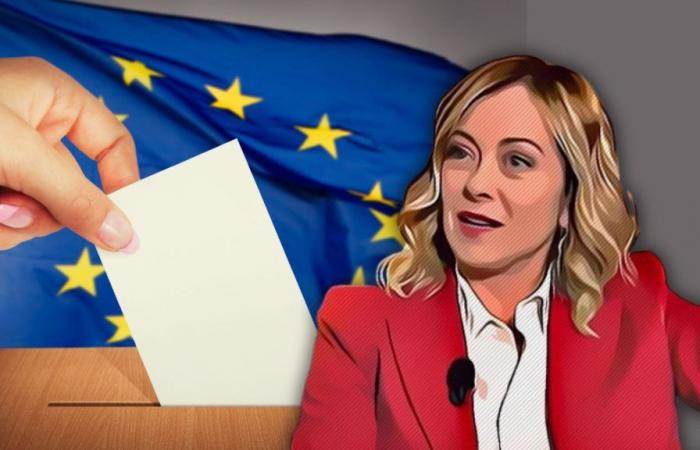* by Francesco Subiaco and Francesco Latilla
Faced with the changes in the European balance of power, confirmed by the latest electoral response (especially in France and Germany), the need for a overcoming the populist seasonreconverting the dispute between “elites” and “people” into a renewed right-left dialectic.
A paradigm of overcoming populist pressures that presents itself as an effective lens for interpreting the Italian case and the changes in the French scenario, and which is the true center of the essay “Post-Populism. The New Wave That Will Shake the West” (Editions of the Observatory) Of Thibault Muzergues: senior advisorEurope & Euro-Med dell’International Republican Institute, scholar, essayist and former advisor to leading figures on the British and French scene. To better understand the evolution of post-populism in the European scenario on the eve of the main electoral challenges, we interviewed the author.
Post-populism and the European elections
FRANCESCO SUBIACO and FRANCESCO LATILLA: In your latest essay you address the evolution of European leaderships towards overcoming populism. What do you mean by this formula and what are the underlying theses of your text?
THIBAULT MUZERGUES: The main thesis of my book is that the populist divide that defined the 2010s, characterized by a frontal opposition between “the people” and their populist representatives on the one hand, and the elites on the other, is fading under the pressure of events and developments in society.
In Europe, this phenomenon translates into a spectacular return to the left-right divide; although the distinction has certainly evolved: today’s right is less liberal, much more socially conservative and marked, for example, by strongly anti-immigration positions, while the left is probably on the opposite side even more radical. A polarized dialectic typical of two elites who propose very different social projects to their fellow citizens.
We were able to observe the return of this division during the European elections in Italy: the two major parties (Brothers of Italy and the Democratic Party) largely dominated the vote, and the “populist” parties (represented by the Five Star Movement and the League) were relegated to a more marginal position.
The new European balances
FSFL: How has the European scenario that emerged from the latest community elections changed and what interpretative keys can you provide us to understand the changes?
TM: The new European Parliament is a lot at the same time the more unbalanced to the right the more fragmented it is than in the previous legislature. The shift of the European Parliament’s centre of gravity to the right is also evident and clear because all the main European parties located to the right of the hemicycle have had a significant increase in their seats: +8 for the Christian Democrat European People’s Party (EPP), which consolidates its leading position in Parliament (with 188 MEPs), +20 for the Conservatives and Reformists of Georgia Meloniand +4 seats for the right-wing populists of Identity and Democracy (ID).
On the contrary, almost all left-wing parties lost votes: the Socialists and Democrats (S&D) managed to contain electoral hemorrhages thanks to good performances in Italy, Spain and France (-4 seats); the Greens lost 18 seats; while the liberals, who have moved to the left during this legislature, are the Biggest Losers of the election with -28 parliamentarians.
In the end, only the far left gained a little – three deputies, and this shows how remarkable the change is, especially because with its 82 deputies, the ECR of Giorgia Meloni It is established as the third force in Parliamentahead of the liberals of Renew Europe (which now only have 73 MEPs). This shift towards the right is then also accentuated by the strong progression of new parties not yet registered (especially of a nationalist or identity orientation), which could form another group to the right of the ID, around the German AfD.
FSFL: What could be the consequences of this mutation?
TM: All of this of course. strengthens atomization of the European Parliament, with two large dominant parties (EPP and S&D) remaining below the 200 threshold and all others below 100 MEPs – and potentially with a new group to the right of ID.
The Return of Italian-Style Bipartisanship
FSFL: Regardless of the results of the European elections in Italy, do you see the birth (or rebirth) of a new bipartisanship?
TM: In a certain sense, yes: the dominance of the Brothers of Italy and the Democratic Party and their leadership reinforces this impression of a consolidation of the right-left dialectic around two dominant parties, with smaller movements that bring together all the souls of the right and all those of the left. However, we must remain cautious: the Italian political scene is constantly changing, and it is not impossible for things to change.
FSFL: What is that?
TM: For example, some disruptive factors They could be a change in the leadership of the League in the next few years or a loss of consensus and popularity on the part of President Meloni (which will inevitably happen).
The other unknown is linked, however, to the electoral consistency of the 5 Star Movement: which, as a representative force of an electorate characterized by young people and citizens from the South of the country, obtained a bad result in the European elections precisely because these voters did not go to vote. However, this does not mean that in a political election it is not possible to consolidate this electorate and obtain a higher score – and this could complicate the political equation on the left.
Conservatism and post-populism
FSFL: During the beautiful event on September 18th promoted by the Italian Atlantic Committee (chaired by Fabrizio Luciolli) “Europe-USA 2024: Transatlantic Challenges”she stated: “Meloni’s post-populism is perhaps the best antidote to populism“. What do you mean by this intuition and how do you evaluate the evolution of President Meloni from her entrance at Palazzo Chigi to the G7 of the last few days?
TM: In fact, post-populism can be considered as a powerful “antidote” because it allows integrate public policies hitherto considered taboo and “populist” and to bring them into the “mainstream” so that the institutions themselves (whether European or national) are no longer “contested”.
My colleagues further to the left will reply that the constitutional reform of the direct election of the prime minister, for example, is a challenge to the institutions, but in reality this objection is wrong: the awarded it is a proposal for institutional reform, which we can support or not support, but which it is part of the Italian institutional framework. We are very far from the grillina revolution of the 2010s, at a time when the entire political class was delegitimized and contested, or when the parties and the Parliament were accused of obsolescence by the supporters of the platform Rousseau.
Let’s see the results today: Italy has often been considered an unstable country, with governments that change every year… This time, post-populist innovation has allowed the country to acquire stability – and this allows it to have more influence on the international scene – today with Georgia Meloni and one day with a left-wing prime minister, also because alternation is just as certain in a democracy as death and taxes are…
France at the crossroads
FSFL: On the eve of the birth of the New Popular Front and of an attempted coalition between the The Republicans and the RN, how do you evaluate the French scenario? And what should we expect in view of the legislative elections in June?
TM: The situation in France is very different from that in Italy, since the duel between populists and elites is still very present in the public debate, and is embodied by the dominance of the personalities of Emmanuel Macron e Marine Le Pen.
The dissolution of the National Assembly allows France to follow the post-populist path traced by Italyto the extent that, in fact, a large left-wing bloc is being reconstituted (less dominated by the far left than Jean-Luc Mélenchon), while a right-wing bloc is also emerging, certainly more timidly but quite clearly, with Jordan Bardella which seems to place the RN in this direction.
However, we are not yet in this direct confrontation: there remains a centrist bloc around Emmanuel Macron which prevents the debate from focusing essentially on the left-right divide. Furthermore, Marine Le Pen (who has always refused to define herself as right-wing) remains today a major contender for the 2027 presidential election…
Beyond Macron and Le Pen, Towards a New Bipolarism?
FSFL: How do you think the role of the Macron presidency and the opposing forces will evolve in the face of a possible cohabitation with a right-wing or left-wing government?
TM: Everything will depend on the outcome of the elections: a Parliament without a majority will be very unstableand this could strengthen the president’s handsomewhat paradoxically. A coalition with the left would be very difficult for Macron, because his “party” would in fact be the “junior partner” of this coalition, and many members of the French left have long been waiting for a showdown with the president.
FSFL: What if RN wins?
TM: The situation would perhaps be more favorable per Emmanuel Macron, who could take a more institutional position, a bit like that of President Mattarella in Italy, as guardian of the institutions. It’s also entirely possible that he gets along relatively well with Jordan Bardellaand this would allow him, in a certain sense, to wear a new objective, that of “Romanize the Barbarians”as they say in Italy.
The crisis of the Tories and the return of Farage
FSFL: Faced with the turbulence of the British political scenario and the metamorphoses of Labour and the SNP, in view of the July elections, how do you evaluate the dialectic between Reform Party e Tories?
TM: The dynamics of the English right is interesting, because it goes against the current of the rest of Europe: where the European right is refocusing or allying itself with the traditional and institutional right in order to exercise power (in Italy, but also in France, Belgium and other countries), in Great Britain the opposite phenomenon is occurring, with the Tories who face very strong pressure on their right from the Reform Party.
Conservatives pay like this wear and tear of power in conjunction with the Brexit, which did not have the desired effects, but which some voters consider a real betrayal. It remains to be seen whether the conservative defeat, which promises to be catastrophic, is simply the cyclical reflection of these two trends, or whether the party will face a long-term rebellion on its right flank…
Follow us on our channels






